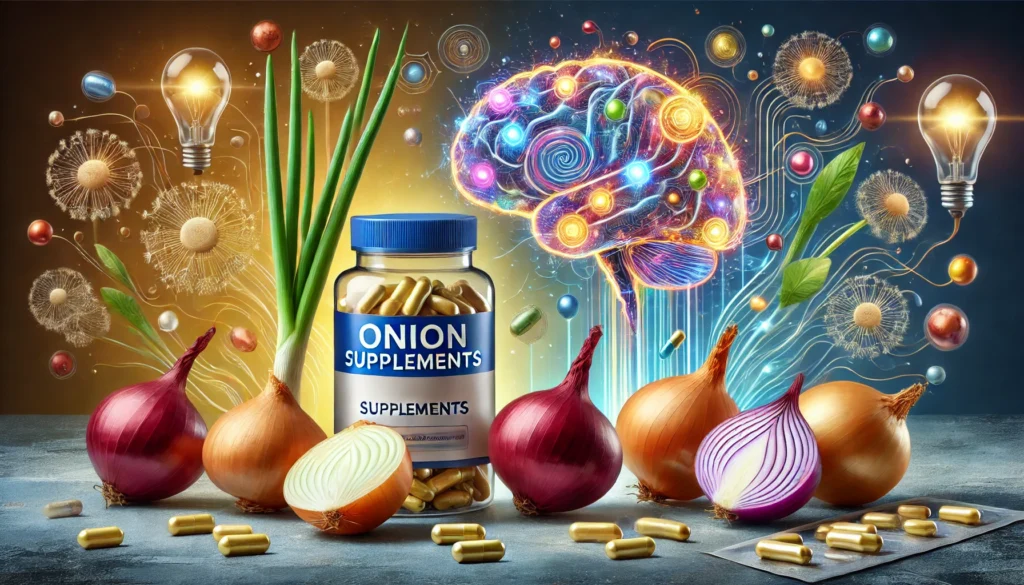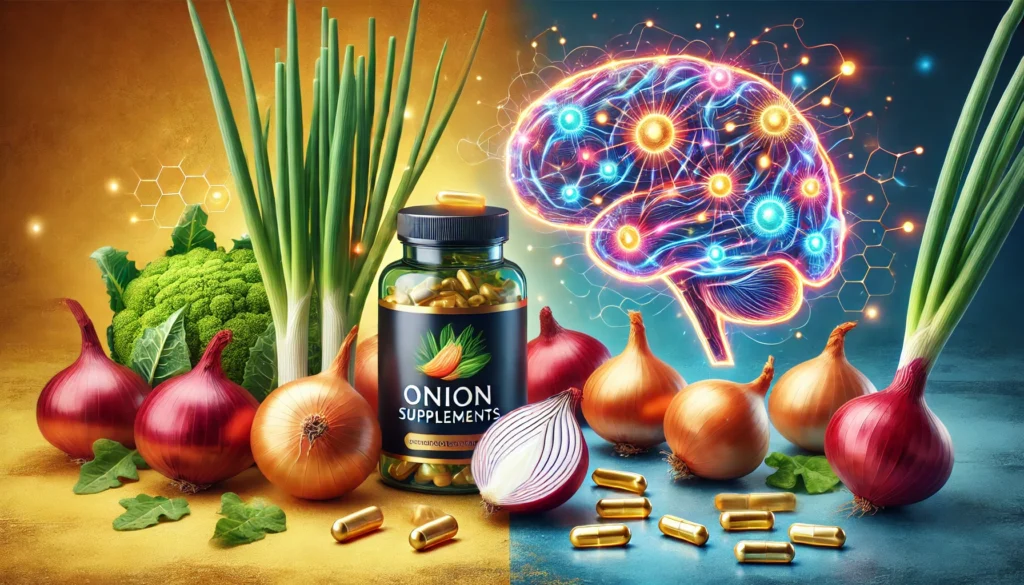Onions (Allium cepa), commonly found in kitchens around the world, are not just a culinary staple, but also a plant with potential health benefits. While onions have long been celebrated for their ability to improve cardiovascular health, fight inflammation, and support digestive function, recent interest has focused on their nootropic potential—how they might enhance cognitive function. This article provides a comprehensive look at onions, detailing their chemistry, physiological mechanisms, potential nootropic benefits, safe dosages, side effects, drug interactions, and relevant safety considerations.
You May Also Like:
Squalamine: Benefits, Dosage, Side Effects, Drug Interactions, and Other Important Information
Onion: Potential Nootropic Benefits, Dosage, Side Effects, Interactions, and Other Important Information About This Supplement is an original (NootropicsPlanet) article.
Sources of Onion
Onions are widely consumed in many forms, ranging from fresh to dried, cooked, or powdered. While raw onions provide the highest concentrations of beneficial compounds, cooked onions can still offer significant health benefits. Common forms include:
- Raw onions: Typically consumed in salads, sandwiches, or as a garnish.
- Cooked onions: Added to a variety of dishes, such as soups, stews, and stir-fries, releasing their beneficial compounds during cooking.
- Onion powder: A convenient form used in seasonings and food preparations.
- Onion supplements: Available in capsules, tablets, and extracts, often marketed for their health-promoting properties.
The active compounds that contribute to onions’ health benefits are found in varying amounts depending on the form consumed, with certain processing methods preserving or enhancing specific compounds.

Chemistry of Onion
Onions contain several bioactive compounds, many of which are sulfur-containing compounds that contribute to their distinctive aroma and health effects. These compounds include:
- Sulfur compounds: The most well-known sulfur compounds in onions are allyl propyl disulfide and quercetin, a flavonoid with potent antioxidant properties. These compounds have been linked to anti-inflammatory, antioxidative, and neuroprotective effects.
- Fructooligosaccharides (FOS): These are prebiotic fibers that promote gut health by supporting the growth of beneficial gut bacteria. The gut-brain axis, which refers to the communication between the gastrointestinal system and the brain, is a vital pathway for cognitive health, making FOS an important factor in the nootropic potential of onions.
- Vitamin C and B6: Both are essential for brain health. Vitamin C acts as an antioxidant, protecting brain cells from oxidative damage, while B6 is involved in neurotransmitter production, which is crucial for cognitive function.
Physiological Mechanisms of Onion in the Body and Brain
The primary mechanisms by which onions may support brain health and cognitive function stem from their antioxidant properties, their impact on inflammation, and their ability to regulate neurotransmitter activity. Here’s a closer look at how onion compounds interact within the body:
- Antioxidant Effects: The sulfur compounds, especially quercetin, possess potent antioxidant properties. The brain, being highly metabolically active, is particularly vulnerable to oxidative stress, which may contribute to cognitive decline and neurodegenerative diseases. Quercetin helps neutralize free radicals, potentially reducing the risk of oxidative damage to neurons and promoting brain health.
- Anti-inflammatory Effects: Chronic inflammation is a key player in many neurodegenerative diseases, including Alzheimer’s and Parkinson’s. Onions, rich in anti-inflammatory compounds such as quercetin and sulfur compounds, may help reduce systemic inflammation, which could have a positive effect on brain function and cognition.
- Neuroprotection: The sulfur compounds found in onions also have neuroprotective effects, which help shield neurons from damage. Studies suggest that these compounds could modulate brain inflammation and oxidative stress, providing a protective barrier for cognitive function as we age.
- Cognitive Function and Neurotransmitter Synthesis: The B vitamins present in onions, such as vitamin B6, are essential for the synthesis of neurotransmitters like serotonin, dopamine, and gamma-aminobutyric acid (GABA). These neurotransmitters are vital for mood regulation, memory, and cognitive clarity. Therefore, onions may potentially support cognitive health by ensuring adequate neurotransmitter production.

Nootropic Benefits of Onion
While onions are not typically considered traditional nootropic supplements, their bioactive compounds may offer several cognitive benefits that qualify them for consideration in nootropic applications:
- Enhanced Memory and Learning: The anti-inflammatory and antioxidant effects of onions may help preserve cognitive function, particularly in areas related to memory and learning. Studies have shown that oxidative damage to the hippocampus, the region of the brain involved in memory, can impair memory function. By neutralizing free radicals and reducing inflammation, onions may contribute to maintaining or enhancing memory retention.
- Neuroprotective Effects: Onions have been shown to have neuroprotective effects in preclinical models. By protecting brain cells from oxidative stress, onions may reduce the risk of neurodegenerative diseases such as Alzheimer’s and Parkinson’s. Quercetin, in particular, has been studied for its ability to reduce amyloid plaque formation in the brain, a hallmark of Alzheimer’s disease.
- Mood Regulation: Because onions contain vitamin B6, which is crucial for neurotransmitter production, they may also support mood regulation. Adequate levels of neurotransmitters like serotonin and dopamine are essential for maintaining a stable mood and preventing cognitive decline related to mood disorders.
- Reduced Mental Fatigue: The prebiotic fibers in onions, which promote gut health, could also have indirect benefits on mental function through the gut-brain axis. A healthy gut microbiome is linked to improved cognitive performance, including enhanced focus and reduced mental fatigue.

Dosage and Supplementation Guidelines
Onions are typically consumed as part of a balanced diet, and most individuals can derive their benefits from regular consumption of food. However, for those interested in using onions or onion extracts as a supplement for nootropic purposes, the following considerations are relevant:
- Dietary Consumption: Including onions in the diet regularly—whether raw or cooked—could provide a baseline level of the active compounds that promote cognitive function. The exact amount needed for nootropic benefits can vary, but it is generally safe to consume onions daily as part of a meal.
- Supplemental Dosage: Onion supplements, typically available in the form of extract, capsules, or powders, often range from 250 mg to 500 mg per serving. For cognitive support, these doses are usually taken once or twice daily, depending on the concentration of the active ingredients. However, research into the optimal dosage for nootropic benefits is still limited, and most benefits from onions are likely to be achieved with consistent dietary intake.
- Prebiotic Dosage: For those seeking the gut-brain axis benefits, consuming prebiotic-rich onion fiber (FOS) in larger amounts may support cognitive function through improved gut health. However, dosages higher than 2–3 grams per day may cause digestive discomfort in some individuals, such as bloating or gas.
Side Effects and Safety
Onions are generally safe when consumed as part of a balanced diet. However, as with any supplement or food, excessive intake may lead to some adverse effects:
- Digestive Issues: Onions, particularly when consumed raw, can cause gastrointestinal discomfort in some people, including bloating, gas, or heartburn. Individuals with irritable bowel syndrome (IBS) or other digestive issues may be more sensitive to onion consumption.
- Allergic Reactions: Though rare, some individuals may experience an allergic reaction to onions, which can manifest as skin irritation, hives, or swelling. Those with a known allergy to garlic (another member of the Allium family) may also be at risk for onion allergies.
- Blood Sugar Regulation: While onions may have a mild effect on blood sugar regulation, individuals with diabetes or those on blood sugar-lowering medications should be cautious and consult with a healthcare provider to avoid potential interactions.
- Breath and Body Odor: Onions can cause strong breath and body odor, particularly when consumed raw. While not a health risk, this is a common side effect that some individuals may find unpleasant.
Ashwagandha aids in memory retention and learning—Support Mental Clarity, Buy Today on Amazon!

Interactions with Other Supplements and Medications
While onions are generally safe, they may interact with certain medications and supplements, particularly those that affect blood clotting and blood pressure. Potential interactions include:
- Anticoagulant and Antiplatelet Drugs: Onions contain compounds that may have mild anticoagulant effects, which could potentially interact with medications such as warfarin, aspirin, or other blood thinners. This may increase the risk of bleeding, especially in individuals on long-term anticoagulant therapy.
- Blood Pressure Medications: Onions have been shown to have a mild blood-pressure-lowering effect. When combined with antihypertensive medications, this may result in an excessive drop in blood pressure, leading to dizziness or fainting.
- Diabetes Medications: As onions may influence blood sugar levels, individuals taking medications to control blood sugar (e.g., insulin, metformin) should consult their healthcare provider before using onion supplements.
Risks for Individuals with Certain Health Conditions
Onions are generally safe for most individuals, but certain health conditions may warrant caution when consuming onion supplements:
- Digestive Disorders: People with conditions such as IBS, acid reflux, or gastroesophageal reflux disease (GERD) may experience exacerbated symptoms with raw onions or high amounts of onion supplements due to their high fiber content and sulfur compounds.
- Allergic Reactions: Individuals with a known sensitivity or allergy to onions, garlic, or other Allium species should avoid using onion supplements.
Should You Consider Onion as a Nootropic?
Onions, particularly through their sulfur compounds and antioxidant properties, offer several potential benefits for cognitive health. Their neuroprotective, anti-inflammatory, and antioxidant effects may contribute to the prevention of cognitive decline and enhanced brain function. While there is limited research specifically on onions as nootropic supplements, their health benefits, including enhanced memory, mood regulation, and neuroprotection, support their inclusion in a balanced diet for brain health.
For those considering onion supplements for cognitive support, it is important to start with moderate doses and consult with a healthcare provider, particularly if there are existing health concerns or medications involved. Ultimately, onions are a promising but underexplored food in the realm of cognitive enhancement, and their benefits may be best realized as part of a broader, nutrient-rich diet.

References:
- Benefits of Making Onion the Star Ingredient. Retrieved from: https://www.healthline.com/nutrition/onion-benefits
- Role of raw onion juice therapy in improving sleep, quality of life and alleviating fatigue among older adults: A triple blinded randomized placebo controlled trial. Retrieved from: https://www.sciencedirect.com/science/article/pii/S2949834123000259
- Onion (Allium cepa) extract attenuates brain edema. Retrieved from: https://www.sciencedirect.com/science/article/abs/pii/S0899900712000950
Important Note: The information contained in this article is for general informational purposes only, and should not be construed as health or medical advice, nor is it intended to diagnose, prevent, treat, or cure any disease or health condition. Before embarking on any diet, fitness regimen, or program of nutritional supplementation, it is advisable to consult your healthcare professional in order to determine its safety and probable efficacy in terms of your individual state of health.
Regarding Nutritional Supplements Or Other Non-Prescription Health Products: If any nutritional supplements or other non-prescription health products are mentioned in the foregoing article, any claims or statements made about them have not been evaluated by the U.S. Food and Drug Administration, and such nutritional supplements or other health products are not intended to diagnose, treat, cure, or prevent any disease.


